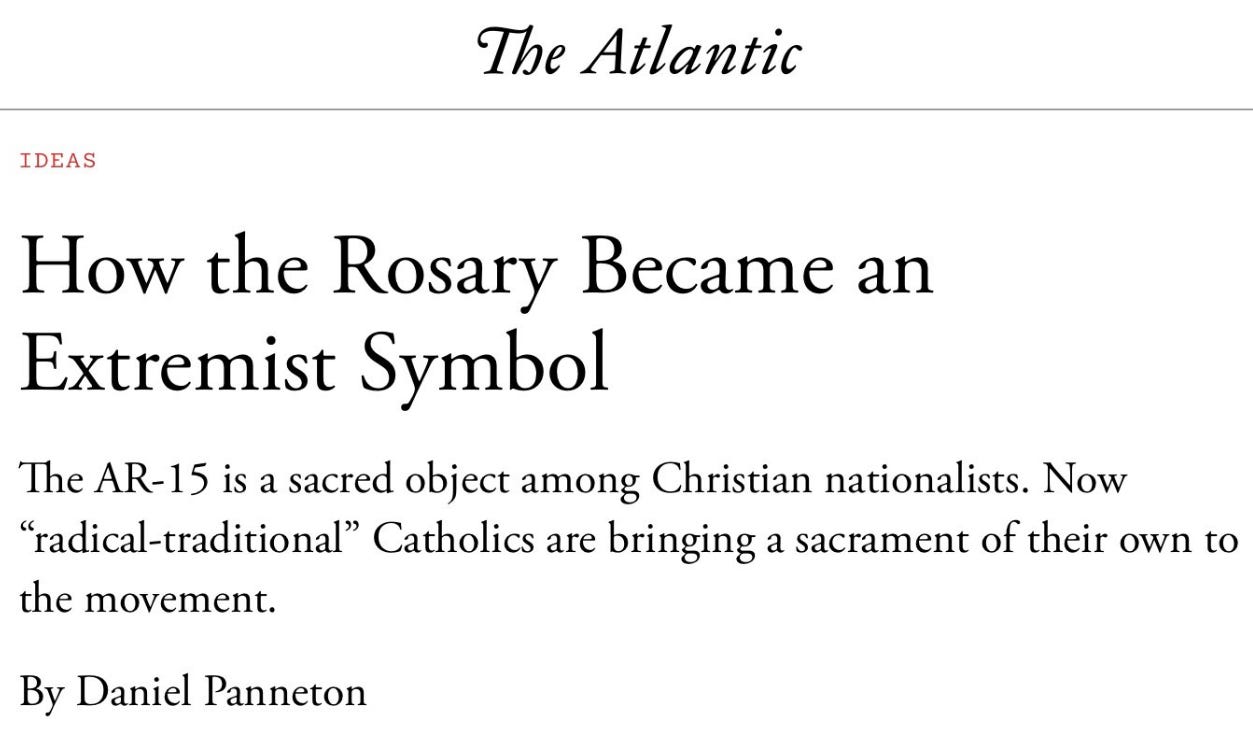Mother Teresa: Christian Nationalist?
Guess what The Atlantic now thinks is on par with an AR-15?
The editorial page of the Fredericksburg Free Lance-Star went straight to the throat of Republican Yesli Vega in her challenger campaign against incumbent Rep. Abigail Spanberger (D-VA).
The editorial itself was neither nice nor kind, specifically as it discussed the ethics surrounding abortion and particularly by contrasting Republican Governor Glenn Youngkin’s temporization on the question versus Vega’s serious-minded principles when it comes to the dignity of human life:
Vega—who has spoken little to the press and not responded to emails or phone calls from The Free Lance–Star—has now twice expressed abortion positions that are both grossly uninformed and steeped in Christian nationalism.
Not only is Vega dangerously uninformed about rape and its consequences, she is making clear what other extremists are now pushing—a total nationwide ban on abortion in the U.S.
Two evangelical, anti-abortion Christian politicians. Two very different understandings of democracy.
Francis Fukuyama in his recent book Liberalism and its Discontents identifies the hallmark of any liberal democracy as the paramount right to personal autonomy, a post-Founding utilitarian idea which stipulates that the highest possible good is avoiding pain and gathering pleasure, ideally for society as well, but ultimately with the individual as the final arbiter.
There are naturally problems with this.
First and foremost, we are not ends unto ourselves. Any number of social ills can be laid at the feet of people who view their good as the highest possible good. Such worldviews create a rather selfish and Hobbesian society rather quickly, and as personal autonomy has come to dominate much of our discourse from abortion to firearms to masks, it is pretty easy to see how social norms have been eroded over the last 50 years.
Second, consider whether the Dobbs decision settled the question of whether or not child sex trafficking would be permitted by the federal government or whether it would be devolved to the 50 state legislatures. Most everyone would agree that child sex trafficking is both wrong and evil, and not just evil but evil in every possible case — intrinsically evil to be precise.
Of course, Dred Scott is a similar instance where a question of moral absolutes was punted to the states. Over 2.5 million soldiers and civilians died to settle that question. So too with Roe v. Wade, with 73 million dead babies littering the landscape in the pursuit of what former Justice Ruth Bader Ginsberg so (in)famously said was an effort to get rid of populations we don’t want too many of.
The point here is that on questions of intrinsic evil, moral clarity is a virtue and not a matter for either moderation or pragmatism. Vega’s position that human life holds intrinsic value and should be protected at all cost presents the counterargument to Fukuyama’s assertion that the American experiment is founded on personal autonomy.
Rather, our Founding Fathers predicated the entire existence of such rights upon a more fundamental and radical right: the basic right to exist.
This contest between the right of personal autonomy and the basic right to exist — basic because from it proceeds certain rights such as personal autonomy — isn’t an anodyne contest. In truth, it is the great question of the next 50 years and cuts through the left/right paradigm in ways where conservatives and progressives find common cause in unexplored ways, whereas more libertarian and liberaltarian thinkers may find themselves more closely aligned than previously considered.
Whereas personal autonomy points towards the self as the ultimate end, the predication of the basic right to exist argues that an individual’s right is best protected by a society; the society is best protected by individuals.
This is the Founding Fathers idea of the common good, or what we might call in Latin the res publica. Personal autonomy would reject this in favor of the pursuit of the highest good, protected by political factions and defined by systems with a claim to an authority that suffers no rivals — the definition of totalitarian.
Which is perhaps why those who do claim the right to personal autonomy as the highest good — incapable of seeing the world in any other way — must define their enemies in like terms:
Vega, by contrast, is a Christian nationalist. She not only rejects the opinions of those who disagree with her and her theology, she would disallow the majority of voters in states like Kansas, who overwhelmingly voted to keep abortion, from setting their own policies.
. . .
As Christianity continues to shed adherents—it has been in a steep decline since 2007—extremists like Vega, knowing they can’t use reason to convert people, have adopted an authoritarian posture.
On abortion, we commend Youngkin for balancing his religious beliefs with respect for the constitutionally protected views of those who disagree. We would like to see him take the same approach in other policy areas.
Vega offers no balance. Just arrogance, ignorance, and an iron fist for anyone who disagrees.
If Vega represents the language of the “iron fist” then one hesitates what to call the language of this particular editorial.
Of course, a defense of the basic right to exist is by no means a religious argument. In fact, it was articulated by the Greeks as an article of reason rather than faith. Moral reasoning is not a faith-based activity, but rather an excavation of the things that are good, beautiful, and true. One hesitates to think of abortion, slavery, or child sex trafficking as any of the three.
Vega can and should be excused for allowing her Christian values to influence her public thought. After all, lawmaking is and remains an inherently moral process. We routinely ask lawmakers to approve of moral laws, reject immoral laws, and actively ask them to discern between the two. So long as faith informs conscience, it is irresponsible to ask lawmakers to check their conscience at the door in order to serve the public they represent.
In fact, we should take such statements a step further. If the history of the 20th century has demonstrated anything, it is that secular religions are far more dangerous than sacred ones.
How many millions died during the Second World War and the proxy wars during the Cold War in service to the gods of democracy and communism? How many were sacrificed on the altar of Eastern Europe in the name of lebensraum? How many are being sacrificed today?
Consider the worst examples. They all have their priests and inquisitors, witch hunts and their tribunals, fanatics and their heretics. Far easier to brand your heretics as something you can hate — Christian nationalists; woke Antifa — rather than engage their ideas in their best possible light.
They Really Do Hate Us: Rosary Edition
Which brings us to this little tidbit in the pages of The Atlantic:
I really don’t have a whole lot of words for this. Two parts contempt; five parts laughter perhaps. Catholics have been praying the Rosary as a devotion for centuries and been called far worse by far worse.
The Catholic Church has outlived every empire for the last 2,000 years. I’m quite certain it will outlive The Atlantic.
Yet you will notice that the political left really doesn’t care too much whether or not they are exhibiting the very same totalitarian impulses they claim to despise. Chiefly because it doesn’t matter. Until they get what they want, they will use every trick in the book in order to impose their will — not by force of argument, but by the argument of force.
Now granted, if not from conscience, then at least from pure monetary avarice did someone decide they took a step too far:
There Are Good Reasons to Defend the Basic Right to Exist
Insofar as the caricature of Christian Nationalism is being bandied about, one has to marvel at how the political left has been cramming all the things they don’t like into the same hypothesis in order to distract Americans from the dumpster fire that the Democratic Party has — pardon the phrase — engendered over the last 18 months.
Yet the real crux of the disagreement — personal autonomy vs. the right to exist — is the more interesting conversation post-Dobbs, and not just for the sake that it cuts through the political divide.
Now I doubt Spanberger and Vega are going to give us that debate in earnest. Perhaps the Free Lance-Star will facilitate it? That would be in keeping with the very best tradition of a free press and an open public square.
Color me unimpressed with half-cute epithets designed to avoid grappling with the deeper and more serious questions we ought to be asking. Charges of Christian Nationalism for praying the rosary? Images of Mother Teresa beating someone to death with a tiki torch in defense of her second-place trophies might make a good comic book on Reddit somewhere, but it is hardly a serious claim reinforced by serious people.
Vega deserves more than just better; she probably deserves an apology.
Or at the very least — a chance.
Shaun Kenney is the editor of The Republican Standard, former chairman of the Board of Supervisors for Fluvanna County, and a former executive director of the Republican Party of Virginia.







